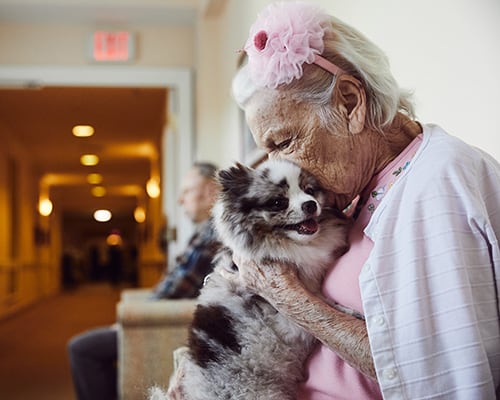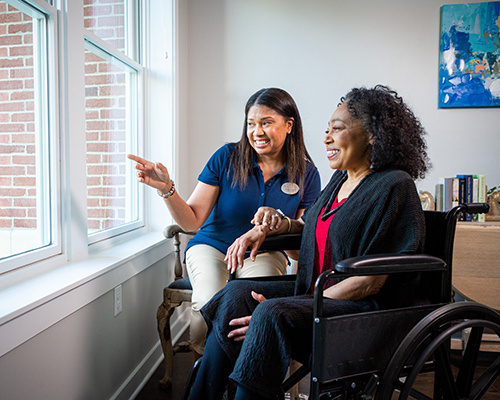Make Brookdale Your Memory Care Partner
For over 30 years, Brookdale’s national team of experts have cared for thousands of individuals diagnosed with dementia. We stay informed on current research and couple these findings with our long-standing person-centered approach to help enhance the health and well-being of those in our care. Our team can coordinate with providers, helping to reduce unnecessary hospitalizations and unwanted transfers. Referring patients to Brookdale’s person-centered memory care can help them at any stage of dementia.
The Vital Role of Brookdale Memory Care
Insights from Dr. Danielle Whitacre
Brookdale Clare Bridge: Personalized Memory Care
Brookdale’s reputation as an industry leader in person-centered Alzheimer’s and dementia care comes from providing best-in-class training to associates and personalized programming across three Clare Bridge offerings: Clare Bridge Crossings, Clare Bridge and Solace. Whether your patient would benefit from our standard Clare Bridge, Clare Bridge Crossings or our Clare Bridge Solace program, our memory care offerings are based on four pillars: innovation, relationship-rich care, purposeful design and security with sheltered freedom.
Clare Bridge is more than a place or a program. It’s a community of hope for people living with dementia and for their care partners. Every aspect of the Clare Bridge approach is infused with purposeful elements for multiple stages of dementia with the daily engagement that those living with dementia need.
Clare Bridge Crossings is a program that's available in some locations for seniors in the early stages of dementia. It’s a stepping stone between assisted living and memory care. Residents enjoy activities like art and dance classes, excursions to museums, journaling to explore life stories and sharing stories around the dinner table with new friends.
The Clare Bridge Solace program, which is offered in every Clare Bridge community, is designed to meet the special needs of residents in the advanced stages of dementia. The Solace program adds an extra layer of programming to engage sensory awareness and focus on comfort and joy.
Experts in Dementia and Alzheimer's Care
Clare Bridge, our Alzheimer’s and dementia care program, is deeply rooted in person-centered care. We focus on sustaining feelings of belonging and purpose while seeking to preserve identity and a sense of self.
We have been evolving memory care through:
We embrace memory care innovation, using new technology such as touch screen computing, light therapy, robotic companion pets, and more
We build bonds and provide residents with a sense of stability and comfort by having a consistently assigned care associate whenever possible.
From our award-winning dining program with dementia-friendly menus to our individualized, gently structured daily activities, we strive to create meaning and purpose in the lives of our residents.
Each Clare Bridge community is designed for wayfinding through signage, visible common areas and recognizable cues to common area spaces. Our purpose-built environments help promote independence and make the community more comfortable for our residents.
Secured entrances and exits help support our Clare Bridge residents while still promoting independence and movement. Our purpose-built spaces include secured outdoor spaces and enclosed courtyards that help encourage freedom through secure exploring.
When the Federal Drug Administration (FDA) determined that anti-psychotic medications should not be prescribed for dementia-related behavioral expressions, we were already out ahead of this finding with our Clare Bridge Seven-Step Behavioral Problem-Solving Process.
In 2002, we created a training resource called the "Clare Bridge Chat Room," a company-wide monthly conference call, where we discuss an actual behavioral problem-solving case and brainstorm ideas for non-pharmacological interventions.
In a model very similar to Project ECHO used in medicine to educate physicians, we blazed a new trail in experiential, peer-based dementia care education.* We still hold the monthly Chat Room call nearly 20 years later, addressing common but challenging situations with person-centered, non-pharmacological approaches.
In 2004, we developed the Survey of Discomfort in Dementia tool for our clinicians to measure discomfort, rule out biological causes for behavior changes and to help promote person-centered care practices.
To further our person-centered practices, we developed a comprehensive problem-solving process in 2005.
In 2006, we made the consistent assignment of care associates a standard in all our Clare Bridge communities. This means that whenever possible, the same care associates are assigned to the same resident to build relationships based on trust and loving concern.
Our care associates also focus on getting to know our residents' histories, routines and preferences to help create a sense of stability and comfort that they are well-known where they live.
*hsc.unm.edu/echo/
Consistently assigned care associates (when possible) have the ability to recognize changes in a resident's condition in a timely manner and can help minimize the spread of contagious viruses like the flu or Coronavirus
Care associates know the residents well and can help anticipate unmet needs to try to avoid or lessen behavioral expressions
We can partner with you, the prescriber, to help lessen the need for psychotropic medications
- Our Clare Bridge communities can meet the needs of residents at different stages of dementia and address clinical care needs, too
Memory care communities have a very firm directive to keep people engaged. For cognitive health and emotional health in people who have dementia, or even just mild cognitive impairment, it’s just critical.
Senior care is ever-changing. We have you covered. Our monthly newsletter contains industry-related articles from our experts and helps you stay up to date on any relevant Continuing Education series topics.
Learn more about Clare Bridge, our exclusive brand of Alzheimer's and dementia care.
Explore helpful and comforting resources to share with your patient and their loved ones to put them at ease.
We can help manage the needs of those living with dementia and encourage them to continue living a purpose-filled life.






